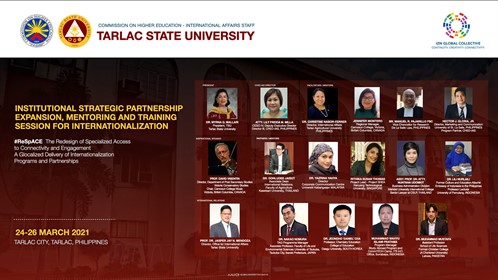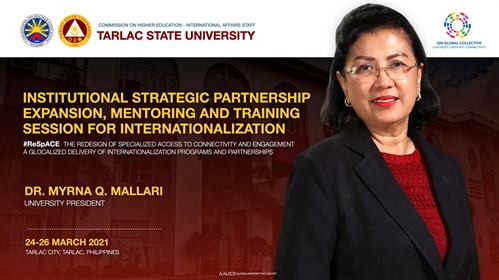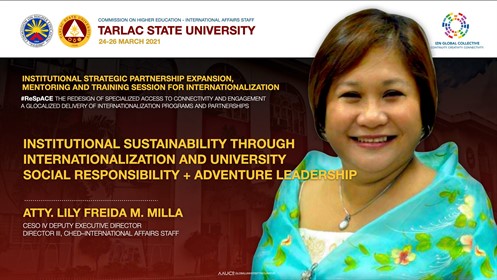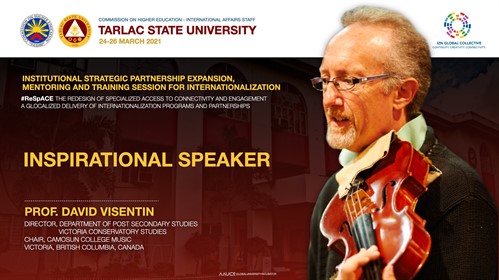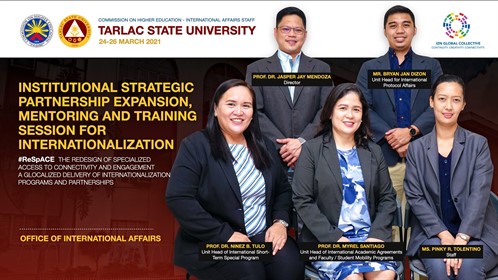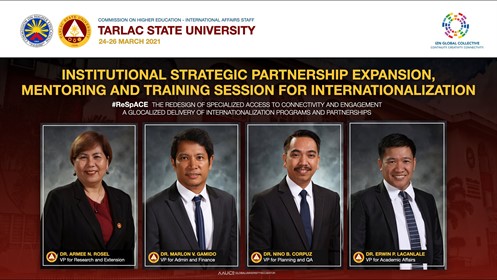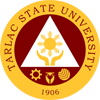TSU traverses global path with international partners
Last March 24 to 26, Tarlac State University organized a mentoring session on strategic partnership expansion and training on internationalization in partnership with the Commission on Higher Education - International Affairs Staff (CHED-IAS) and the IZN Global Collective held via Zoom.
The event themed “#ReSpACE – Redesign of Specialized Access to Connectivity and Engagement” is a bold move of the university in starting and reinventing its internationalization and flexible learning efforts.
Speakers from Canada, Indonesia, Malaysia, Thailand, South Korea, Japan, Singapore, and Pakistan shared insights, practices, and resources which opened doors for a fresh perspective on internationalization and flexible delivery of teaching and learning amid the global health crisis.
According to Prof. Myrel M. Santiago, a unit head of TSU Office of International Affairs, the three-day event is aimed towards realizing the vision of TSU to become a premier university.
“During the exchanges of policies, programs, and practices, we saw and felt that there was a heart in what our [prospective] partners have been doing. Thus, we at OIA think that after the event, our commitment towards IZN will commence as everyone is excited to start a project or a program with our respective speakers not just for status symbol but to improve the learning and experiences of our students [and to provide a] better branding and marketing of TSU in the IZN arena,” Prof. Santiago said.
In an opening message, TSU president Dr. Myrna Q. Mallari shared the internationalization efforts of TSU which started in 2004 with an agreement inked with Lifelong College in Hong Kong. Since then, the university has started admitting foreign students to programs approved by the Board of Regents where TSU professors travel abroad to render academic services.
The first day of the event saw high caliber speakers who gave a macro-level perspective on international affairs. Atty. Lily Freida M. Milla of the CHED-IAS highlighted the importance of Philippine internationalization sustainability and institutional sustainability in this time of pandemic. She also urged TSU to maintain continuity of services as a higher education institution (HEI), exercise creativity in coming up with new programs and innovative approaches to education, and ensure connectivity and technological readiness to connect locally and globally. Furthermore, Atty. Milla dubbed TSU as “The Sustainable University.”
Prof. David Visentin of Camosun College in Canada shared an inspirational message on internationalization which he paralleled with music. Being a performer, conductor, pedagogue, arts administrator, and expert in music, Prof. Visentin, the Chair of Music at Camosun College and Director of Victoria Conservatory of Music, said that music is the universal platform for mutual understanding which can bring the world together.
Meanwhile, Dr. Lili Nurlaili of the University of Pamulang in Indonesia tackled the national perspective and initiatives of Indonesia towards internationalization and showed a comprehensive diagram on diversity, equity, and inclusion; data-driven decision making; and agility and transformation.
On internationalization amid pandemic and e-programs, Prof. Muhammad Wahyu Islami Pratama of ITS Surabaya of Indonesia imparted their strategies and initiatives which could be adopted by TSU, while Prof. Rithika Susan Thomas of Nanyang Technological University in Singapore discussed the project-based learning for Filipino student innovators along with a sharing of their Project SHEA. These jumpstarted the sharing on strategic directions implemented by mentioned schools.
Tarlaqueño speakers also graced the first day of the activity. Prof. Marcelino P. Balanquit of TSU introduced the Tarlac cultural branding through the international exposure of the award-winning TSU Performing Arts Dance Troupe and the TSU Chorale, while Dr. Christine N. Ferrer of Tarlac Agricultural University tackled the strengthening of international visibility and reputation.
“[Internationalization] cannot happen in a few internal connections. It must be felt in heart of every constituent. We also need to consider the quality of our partnering institutions,” Dr. Ferrer said in her presentation.
On the second day, the focus was shifted to the blending of internationalization efforts into instruction, research, and extension with an emphasis on being an educator with a heart.
Two speakers highlighted the importance of humanity in teaching especially in this new normal context. Dr. Muhammad Mustafa of Forman Christian College (a Chartered University in Pakistan) talked about his experience in the global leadership on science instruction remote learning where he also emphasized the QS rankings for excellence. He shared practical applications and necessary skills for teachers in the classroom while looking into the heart of the students. Dr. Daniel Cha of Daegu University in South Korea presented a short but entertaining video on coping mechanism of their students and the blessings brought about by the COVID-19 pandemic – an experience similar to Dr. Mustafa’s but in the Korean university context.
Br. Manuel Pajarillo, Vice Chancellor for Research of De La Salle in Lipa City, Batangas, noted that reworking the university research agenda, establishing internal and external networks, and aiming to be part of a global academic community are key considerations in internationalization. Meanwhile, Dr. Nakao Nomura of the University of Tsukuba in Japan strengthened Br. Pajarillo’s points. He discussed their university’s experience in the resilient response to national issues backed up by technology and innovation.
Asst. Prof. Dr. Nuntana Udomkit of Mahidol University in Thailand talked about business entrepreneurship in today’s pandemic and presented data that could influence program design in this changing environment, while Dr. Donludee Donnie Jaisut of Kasetsart University in Thailand shared the wide influence of HEIs in their country and its internationalization model. He said that educational institutions must contribute to their respective countries.
In pushing internationalization efforts, Ms. Jenni Montero, Regional Manager of Camosun College in Canada imparted her extensive experience in setting up and running internationalization programs and connecting Philippine universities to the rest of the world which is beneficial to TSU’s journey towards the global path. She also shared Camosun College – five decades of milestones as they honor their beautiful past and continue to inspire the future.
The last day of the webinar highlighted collaborations and communications. Dr. Yazrina Yahya, Deputy Director of the Center for Leadership Sustainability Higher Education Leadership Academy in Malaysia shared how they developed a leadership ecosystem through internationalization innovative collaboration. Dr. Yahya also pointed out the benefits of internationalization through research and training, brand recognition, academic quality, and diversifying the campus experience.
Lastly, on the communications field, Mr. Hector J. Gloria, Jr. of University of St. La Salle in Bacolod, Philippines presented the importance looking within the institution to strengthen internationalization branding of an institution and the essence of being a global educator amid this pandemic.
Most of the speakers stressed the importance of the 17 Sustainable Development Goals of the United Nations with Atty. Milla providing a statement of continuous support from CHED as TSU continues to thrive globally.
As a response to the speakers’ presentations, Dr. Jasper Jay N. Mendoza, the newly designated director of the TSU Office of International Affairs expressed his delight and excitement to pursue further the internationalization efforts of the university.
Dr. Mendoza conveyed the strategic direction of TSU on internationalization saying, “We want to expand global awareness and appreciation of international learning opportunities in the university. We are also aiming to have short-term international programs and projects for English Language proficiency.”
Through this event, TSU is targeting to build more international opportunities for students, faculty, and staff. The university will also develop strategic networking and collaborations with other institutions which will expand global awareness of international learning at TSU. With these objectives, a harmonization of craft, aligned processes and procedures, and policies and regulations to CHED Memoranda will be materialized. [Maria Adelaida D. Calayag, Jazzel Llaneli M. Manabat]
